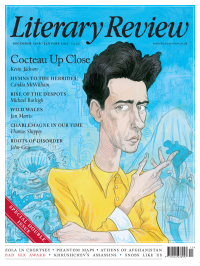Benjamin Ivry
An Uncommon Life
Flaubert
By Michel Winock (Translated by Nicholas Elliott)
Belknap Press/Harvard University Press 549pp £25
French-language authors still have a problem with the art of biography. With no shining predecessors such as James Boswell, Elizabeth Gaskell or John Forster to guide them, Gallic writers tend to produce hagiographies or demolitions, with scant room left for other approaches. For this reason, it was useful when the historian Michel Winock produced a biography of Gustave Flaubert for Gallimard in 2013. The book has now been translated into English. It is stately and plump, like its subject, as well as thought-provoking. To be sure, Geoffrey Wall and Frederick Brown have in recent decades produced English-language biographies of Flaubert, but Winock has the depth of knowledge and familiarity with Flaubert’s times to add something new. One of the most dramatic moments of Flaubert’s life came during the Paris Commune, and Winock’s first book, published in 1964, was about the communards. Winock has also produced books on Victor Hugo and Madame de Staël, showing special interest in how literature and politics mix. Flaubert once wrote to his friend Jules Duplan, ‘characters from history are more interesting than fictional ones’. Having written previously on history and literature, Winock is well qualified to shed light on Flaubert. And there is surely light to be shed.
In a 1951 essay, Saul Bellow asserted:
Flaubert, hating common life, displaced his enormous energy from subject matter to style. If literature was a heroic enterprise, it had to be so in spite of the degeneration of life. Flaubert’s aim was an aesthetic one: the creation of beauty

Sign Up to our newsletter
Receive free articles, highlights from the archive, news, details of prizes, and much more.@Lit_Review
Follow Literary Review on Twitter
Twitter Feed
How to ruin a film - a short guide by @TWHodgkinson:
Thomas W Hodgkinson - There Was No Sorcerer
Thomas W Hodgkinson: There Was No Sorcerer - Box Office Poison: Hollywood’s Story in a Century of Flops by Tim Robey
literaryreview.co.uk
How to ruin a film - a short guide by @TWHodgkinson:
Thomas W Hodgkinson - There Was No Sorcerer
Thomas W Hodgkinson: There Was No Sorcerer - Box Office Poison: Hollywood’s Story in a Century of Flops by Tim Robey
literaryreview.co.uk
Give the gift that lasts all year with a subscription to Literary Review. Save up to 35% on the cover price when you visit us at https://literaryreview.co.uk/subscribe and enter the code 'XMAS24'